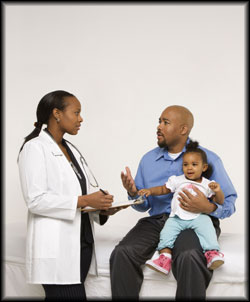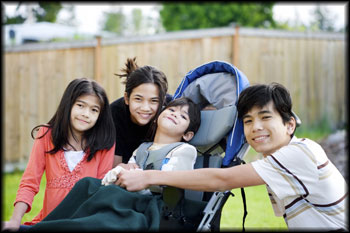Working together with families to improve the system of care for children and youth with special health care needs
 Pediatric Resident Training Program
Pediatric Resident Training Program
The Pediatric Resident Training Program (PRTP) is a three-part teaching program on family-centered care for 1st and 2nd year pediatric residents at the University of Minnesota Medical School. The purpose is to teach principles of family centered care and to provide a family’s perspective on health care for children and youth with special health care needs.
- Pediatric residents meet with a PRTP facilitator for a session on working with families and youth in a medical home and a general overview of family-centered care.
- Residents schedule and visit a family in their home. The family and youth share information about their family, providing perspectives and insights into what makes for collaborative, coordinated, respectful care.
The residents have a processing session with the facilitator and family, when possible, to share thoughts about the home visit and to provide written feedback in an evaluation form.
Medical Home
A medical home is a coordinated, family-centered way to provide care for children with special health care needs and disabilities. Through a medical home, a doctor and his or her staff coordinate care and information among health, education, insurance, and social service professionals.
Family-centered Care
Patient- and family-centered care is an approach to the delivery of health care that is based on the idea of partnership among patients, families, and providers. This philosophy recognizes the importance of the family in the patient’s life, and incorporates the family’s perspective into medical decision-making. This type of care is particularly important to families of children with special health care needs.
Health Care Transitions
One way to improve health outcomes for youth with special health care needs is ensuring that they successfully transition from pediatric to adult health care. Health care providers help with this transition by ensuring youth:
- Understand their changing health needs
- Take more responsibility for managing their own care
- Identify appropriate adult health care providers
- Maintain insurance coverage
Minnesota Specific Information for Health Care Professionals about Working with Families with special health care needs
 As health care providers know, children and youth with disabilities and special health care needs require more intensive and specialized day-to-day care than is typical for other children. Much of this care is accomplished by families, while they deal with a fragmented and complex system of services and supports. Health care providers can assist families by:
As health care providers know, children and youth with disabilities and special health care needs require more intensive and specialized day-to-day care than is typical for other children. Much of this care is accomplished by families, while they deal with a fragmented and complex system of services and supports. Health care providers can assist families by:
Understanding the basics of health care financing
and financial resources
- There are public health insurance and other financial supports for families of children with disabilities.
- In Minnesota, county human services departments should be a first stop for families of children with special health care needs to access Minnesota Health Care Programs and financial resources. The Minnesota Tribal and County Health Care Directory includes updated contact information for all county and tribal offices.
Helping families develop skills in advocacy and navigating the system of public support
- Many additional public services and supports may be available to help families care for their child with a disability or special health care need.
- In Minnesota, these are administered through county case managers. In addition to seeking health care and financial support, families should complete a county intake for developmental disability or children’s mental health services for their child. Services such as home and community based waivers, grants, and supported employment are accessed by completing a county intake process.
Offering information about community integration and supports
- Every state has a Family to Family Health Information Center and a Parent Training and Information Center to help families of children and youth with disabilities and special health care needs.
- In Minnesota, these resources are housed at PACER Center.
- School districts provide many services for children with disabilities through special education.
- Minnesota is a “birth-mandate” state for early intervention services for young children with disabilities. This means Minnesota families of children with disabilities of any age should call their school district for services.
- Every state has Vocational Rehabilitation Services that can help youth and adults with disabilities find employment.
- Minnesota families can contact the MN Department of Employment and Economic Development for help.
- There are many general and disability specific resources for additional support.
- In Minnesota, families can find a Resource List of Disability Organizations from PACER
Developing cultural competence in themselves and their colleagues
- Cultural competence requires that providers actively express recognition, value, and respect for each patient’s and family’s cultural background.
